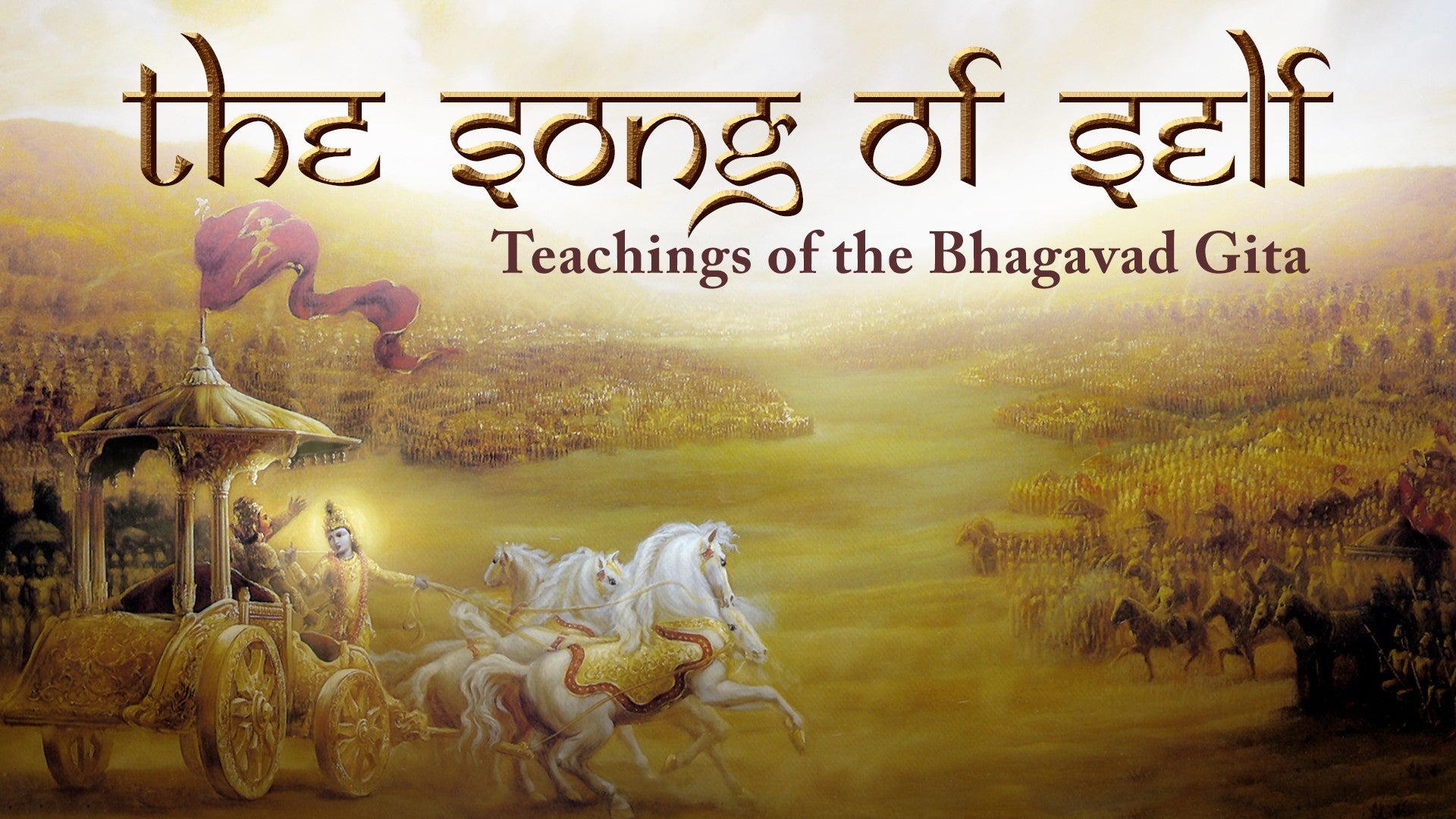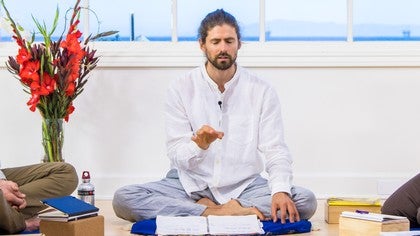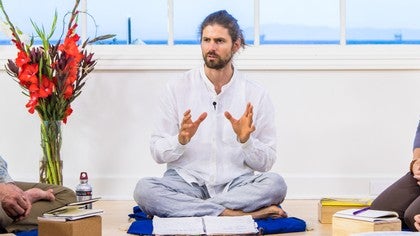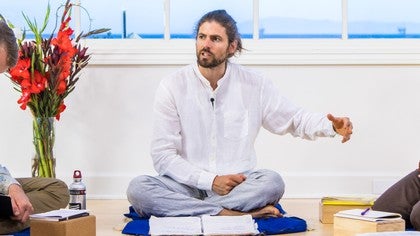Description
About This Video
Transcript
Read Full Transcript
So, Krishna's been advocating skillful, recognizant use of the powers of our senses. And now, in the 62nd and 63rd verses, Krishna does something really, well, he does it very beautifully, and it's something that he uses a lot through the Gita, he uses the power of contrast. And so in these next two verses, it seems actually something quite staggering, is he basically tells us the whole story of human history in 64 syllables. And he tells us what happens if we don't learn to harness and bring together the potentially disturbing powers of our bodies and senses. So he says, dhyayato vishayan pum saha, sangasteshupajayati, sangat sanjayati kamah, kamad krotobhijayati, krodhat bhavati samuhah, samuhat smite vibhramah, smite bhramshad buddhinah shaw, buddhinah shad pranashati.
So what is this story of human history in 64 syllables? Krishna says, dhyayato vishayan pum saha, so pum saha, a human being who, dhyayato haas, you remember the word jhana, focusing on, contemplating on, meditating on, vishayan means objects, similar words, objects of the senses, things that come and go. So Krishna says, if as a human being you give a lot of attention, a lot of focus to the transient things that come and go, what happens? Sangaha teshu upajayati, then sangaha, which means attachment, teshu, to those things, in those things, upajayati arises. I think this is true, yeah?
If we give a lot of attention to something, then we get attached to it. If, for example, we contemplate, oh, yeah, I really want to have that, fill in the blank, ice cream, car, husband or wife, job, whatever, these things, these worldly things, if we get a lot of focus to them, it can really start to have a strong binding influence on us. So if we focus on sense objects, we get attached to them. Attachment to them arises. But when this attachment arises, does it arise up all by itself?
No, what happens? Sangat, sangayati, karma, sangat, from that attachment, what comes? Karma, the desire, yes? When you're attached to something, you want it or you want to avoid it, yes? But does karma come up alone?
Oh, no. Kamat, from karma, krodhah abhijayati. From karma, from desire, is also born, is also produced, krodhah, anger. Now, it's important to note here, krodhah doesn't just mean kind of like, ah, like rage, this means all that anxiety. So let's say, for example, there's something we really want and we don't get it. We might not be enraged, but we feel that tension, that anxiety, that frustration.
So the idea, we focus on sense objects, give them a lot of focus, we get attached to them, we want them, desire comes. And with that desire also, if that desire is not met, what happens? There is tension, there is anxiety, there is anger. But what does anger lead to? The next verse, krodhat bhavati sammohah.
From anger, krodhat, sammohah. Confusion. And this is so true, no? When we're angry, do we see clearly? Do we make skillful judgements?
When we're angry, it's like we start to get clouded. Sammohah, we get confused. Sammohah, smiti vibramah. When we start to get clouded and confused in anger, then what happens? Smiti vibramah, it's like we lose our memory.
Or in other words, we forget the lessons we've already learnt. We lose access to the wisdom that we have learnt through experience. We forget things we already know. Smiti vibramah shad buddhinah shaha. And when we forget the things we've already learnt, then it's like we lose our discrimination, we lose our discernment, we lose our wiseness, our wisdom.
And once we lose our discriminating awareness, buddhinah shad pranah shati. Then we're lost. Then we destroy it. And these verses, you know, I remember the first time I translated them, I was like, wow, so true, yeah. This thing about how we lose the lesson, how we lose contact with wisdom we've seen, we thought we'd already accrued.
But the idea, the wisdom, we're not really established in it, we're still learning that lesson. But the idea is this vicious cycle, yeah, and this is also the binding influence of action. We want something, and we don't get it. And it sets in motion this cycle where we start behaving in ways which are not perhaps really the ways we would like to behave. So if we do continue to focus on these external objects, then it can be like we entrench ourselves more deeply into this vicious circle of desire, action, impression.
And when we get more deeply entrenched, what happens? When we forget the lessons we've learned, and we lose our discernment, and we're lost. But that's not such a disaster. We can see why I said this is a story of human history. We see, you know, people often say, oh, history, there's nothing new under the sun.
We see human beings in societies and civilisations, so-called civilisations, repeating the same mistakes. And we look at our own lives, and sometimes we feel, oh, I've been here before. How have I fallen into this trap again? But there's the idea. Krishna says, buddhinasal pranashati, when we lose our discrimination, then we're really lost.
Where was Arjuna at the start of this chapter? He was completely lost. We don't know what to do. But when we acknowledge and own the fact that we're lost and we don't know what to do, this is perhaps the most important step to becoming found, is when we acknowledge that we don't know how I'm lost, this is such a key step to actually moving forward to a place of newfound understanding and becoming found, regaining, recognising, regaining ourselves, regaining a sense of who we really are, recognising who we really are. So yes, this cycle is one that we're probably all familiar with.
We might have all experienced personally and around us and in the bigger picture of human society and history, but that's how we learn. So no problem. Krishna's just being very realistic and reminding us what can happen all too easily if we don't pay attention as a human being. But remember, right at the beginning, Gita has been really emphasising be alert, be attentive. And now, as he continues, we're going to see again the skilful use of contrast.
So we'll continue in a moment with the 64th verse.
The Song of Self: Bhagavad Gita: Chapter 2
Comments
You need to be a subscriber to post a comment.
Please Log In or Create an Account to start your free trial.










